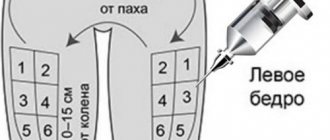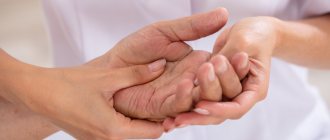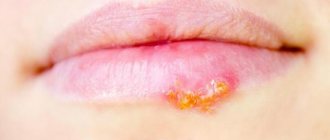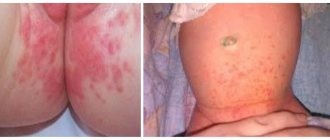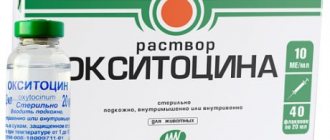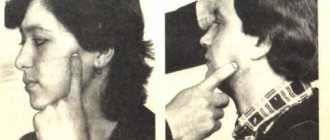Panic attack is an attack of severe anxiety, fear, panic, which is accompanied by certain vegetative (bodily) reactions.
The duration of attacks can vary from several minutes to several hours, averaging 15-30 minutes.
For an anxiety attack to be identified as a panic attack, it must have at least four of the following core symptoms:
- Rapid pulse;
- Sweating;
- Feeling short of air, shortness of breath, difficulty breathing;
- Chills, tremors, internal trembling;
- Pain or discomfort in the left side of the chest;
- Nausea;
- Dizziness, lightheadedness;
- Derealization, depersonalization;
- Fear of going crazy or doing something uncontrollable;
- Fear of death;
- Feeling of numbness or tingling in the extremities;
- Insomnia;
- Confusion of thoughts;
Other (additional) symptoms may be present:
- Abdominal pain,
- Elevated temperature
- Stool disorder
- Frequent urination,
- Feeling of a lump in the throat
- Gait disturbance
- Visual or hearing impairment
- Cramps in the arms or legs,
- Motor function disorder
- High blood pressure.
Patients often talk about the spontaneity (unprovoked) of attacks. However, during the conversation it often turns out that along with spontaneous manifestations of PA, there are also situational attacks that occur in places perceived by a person as potentially dangerous. Such places and situations include:
- Using public transport;
- Staying in a large crowd of people or, conversely, in a confined space;
- And sometimes even, simply, the need to leave your own home.
This list can go on for a long time, but we will stop here.
Free psychological help awaits you on Tik Tok. Just go to the @psy_malin and click “Ask a question” or write a personal message to psychologist Dmitry Malin.
Get to know the essence
As you know, a panic attack occurs groundlessly, without a real threat. She can find her carrier at home watching TV, at work or in her bed at night.
Its main driving factor is fear: death, hopelessness, fainting or having a heart attack. These are the thoughts that visit a panicker at the peak of an attack. They, in turn, trigger a pathological reaction in a circle until the psycho-emotional stress decreases. At the moment of such a cyclical process, there is a certainty that it will never end.
Where does this fear come from? It is provoked by a neurochemical imbalance: the amount of stress hormones (adrenaline, norepinephrine) prevails over serotonin, the hormone of happiness. This happens for various reasons: chronic stress, overwork, sedentary lifestyle, internal conflicts, bad habits, etc.
It is the feeling of fear, fueled by adrenaline, that causes a number of painful physiological symptoms. Among them are suffocation, chaotic fluttering of the heart muscle, profuse sweat, trembling, dizziness. All this is the result of a sharp narrowing of blood vessels and excess oxygen in the blood. Extreme fear drives a person to madness. He does not understand where he is, the world around him seems blurry and unclear.
The fight against a panic attack, as a malicious disturber of a person’s peace, begins when he realizes one fact: this condition is not a sign of a physical illness (if you do not have concomitant diseases). It is impossible to die from it, your heart will not stop, you will not suffocate from lack of air, you will not even faint.
Take and analyze your attack. When it ends, all symptoms go away and your body works smoothly again. The heart does not jump out of the chest, breathing is smooth, blood pressure is normal.
Surely you have already undergone all kinds of examinations, checked every organ, visited all the specialists. If their diagnosis is unanimous and confirms that you are physiologically healthy, shift the focus in the other direction: look for the problem in your head, in your mental state. Understand that a panic attack is the result of a mental imbalance, so it is not the body that needs to be treated, but the soul.
Questions and answers
Have there been any cases of death due to PA in medicine?
No, the concept of PA implies a feeling of fear, as well as a number of other physiological changes. They are strong in intensity, but not so strong as to lead to the death of the body.
Who is more susceptible to the disease - men or women?
Individuals, regardless of gender or age, are prone to the disorder.
What mental disorders can cause the disorder?
At risk are schizophrenics, people diagnosed with bipolar affective disorder, manic-depressive psychosis, and various phobias.
An integral part of treatment
If you yourself are not able to improve your psycho-emotional background, seek help from a specialist. Psychotherapy is an integral part of the treatment of panic attacks. It is she who will allow you to get to the very essence, to understand why such shocks are happening to you. Along with “diagnosis” of the problem, it allows you to find ways to solve it.
The main method of psychotherapeutic treatment of panic disorder is cognitive behavioral therapy . It relieves anxiety and allows you to change the patient’s perception of his problem. The following techniques are used:
- self-observation diary;
- immersion in an alarming situation;
- meditation, muscle relaxation;
- proper breathing techniques.
The course of therapy is 10–20 sessions.
Other psychotherapeutic areas are also used in the treatment of panic attacks :
- Gestalt therapy;
- neurolinguistic programming;
- body-oriented therapy.
Hypnotherapy is in wide demand . To characterize it in a rough form, the doctor puts the patient into a trance and in this state instills in him certain instructions for getting rid of panic attacks, that is, he works with the person’s subconscious.
There is a softer form of hypnotherapy -
Ericksonian hypnosis .
In this case, the person is also in a state of trance, but retains the ability to communicate with a psychotherapist. The doctor does not give specific instructions to the patient, but provides him with the opportunity to understand his internal conflicts. Family therapy can also have positive results. It forces us to consider a person’s problem not only as his personal one, but also as a result of a lack of support from loved ones. The method teaches the patient’s relatives how to help him fight the disease and provide support.
Do not neglect psychotherapeutic methods. They radically change the patient’s thinking, attitude towards the situation, and lead him to self-knowledge. Such steps become key in getting rid of unreasonable anxiety.
Film actress Emma Stone first experienced a terrifying panic attack when she was 10 years old. She was visiting her friend. Just sitting down on the sofa, she was suddenly overcome with horror, it seemed to her that the house was on fire. She couldn’t get up from the sofa, sobbing, she called her mother to pick her up.
Since then, panic attacks have become a part of her life. She constantly forced her mother to tell her that everything was fine, nothing had happened, there was no danger. Persistent and long-term psychotherapy helped her get rid of these crises.
Drug therapy
Certain medications can help reduce some of the symptoms of a panic attack. If the patient’s brain has a disturbance in the exchange of neurotransmitters, the balance of the processes of excitation and inhibition, then they are prescribed much more than in milder cases.
At the first stage, medications relieve the attack, and then restore the functioning of various brain systems. They are able to eliminate the panic state altogether, or weaken it.
- Tranquilizers are prescribed at the very beginning of treatment and not for long, as they cause addiction. These drugs extinguish the severity of the attack, stabilize the autonomic system, and normalize sleep.
- Antidepressants require caution - you need to be careful about their contraindications, so the selection is strictly individual. It is interesting that similar products from different manufacturers can have different effects on the patient.
- Antipsychotics are used extremely rarely - only if panic disorder cannot be cured with other medications, as well as in the presence of a personality disorder or metabolic disorders in the brain. In addition, they are very difficult to find.
- Neurometabolic drugs are very active, so they are used strictly in courses and administered in the presence of a doctor. They allow you to reduce the doses of other psychotropic drugs.
It is necessary to emphasize once again that all of the above medications are prescribed personally. The doctor should pay special attention to their effect on the patient, especially in the first days, monitor the intake, cancel and re-prescribe in case of adverse events.
Pharmacotherapy
It is impossible not to mention the drug treatment of panic attacks. There are many doubts about this method. Some patients say that stuffing themselves with chemistry is not a solution. Perhaps in some sense they are right. Without working on yourself, no one can give a 100% guarantee that the disease will not recur after completing the course of drug therapy.
But still, the positive role of drugs cannot be denied. They allow you to balance the emotional background, eliminate acute anxiety, relieve tension, normalize mood, provide an opportunity to relax, and improve sleep.
Typically, antidepressants and tranquilizers are prescribed to treat panic disorder.
Without awareness of your problem, of course, it is difficult to overcome the disorder forever. But pharmaceuticals will help you achieve this faster and easier.
Based on this, it is strongly recommended to combine psychotherapeutic and drug treatment. The combination of these methods is ideal for combating panic attacks.
Panic disorder
Panic attacks are a symptom of what is called panic disorder.
Panic disorder (episodic paroxysmal anxiety) is a mental disorder that is characterized by the spontaneous occurrence of panic attacks from several manifestations per year to several times a day and restless anticipation of their occurrence.
“Panic disorder” is recognized worldwide as an independent disease. It is included in the International Classification of Diseases, 10th revision (ICD-10)
Some Russian doctors use outdated terms that are not in the ICD, but they emphasize the type of disorder of the autonomic nervous system depending on the leading symptom:
- "vegetative crisis";
- “sympathoadrenal crisis”;
- "cardioneurosis";
- “VVD (vegetative-vascular dystonia) with a crisis course”;
- “NCD” (neurocirculatory dystonia)
How to behave during an attack
The alarmist should be able to determine the onset of an attack. Muscle twitching appears, the legs become as if they are made of cotton, and coldness passes through the body. Shortness of breath appears, consciousness narrows, attention is fixed at one point.
When you feel the first warning signs, try to leave the room where you were attacked. It's best to go outside. You can take out your phone and call someone, distract yourself with information on the Internet.
If you cannot change your location, for example, this happened on a bus, try to switch your attention. The best way is to count any objects you find at hand:
- buttons and other clothing items;
- trees;
- machines, and you can use different variations. How many red or black cars have passed? How many cars move in one direction, and how many in the other;
- pillars;
- if you are in a crowd, count how many men and how many women you see;
- windows in houses.
Take one position. Stand, or better yet, sit down. Take a comfortable position. Lean on something solid and stable.
You can distract yourself by changing your bodily sensations. Pinch, lightly pull the hair, hit yourself with little force. Try to actively change your facial expressions: puff out and deflate your cheeks, pinch and spread your lips in a smile, close and open your eyes.
Perhaps, instead of a frozen pose, physical exercise will bring you out of horror. Squat, jump, you can run lightly, imitate jumping rope.
Another way to shift attention is to sing a song, out loud and loudly, or recite a verse also loudly and with expression. The text should be positive and not evoke gloomy emotions.
Actress Megan Fox discovered an interesting method of dealing with a panic attack. Usually they started on the plane. After she started playing Britney Spears songs and listening to them in headphones throughout the flight, the attacks stopped.
Be sure to control your breathing. You need to eliminate excess oxygen in the blood. To do this, try to breathe deeply. Take a deep, long breath and a loud, long exhale. Try to get all the air out of your lungs.
The most effective way to restore respiratory calm is to breathe into a bag or folded palms.
If a panic attack strikes you at home, take a contrast shower.
Of course, if the attack happened to a person for the first time, it will be difficult for him to control it. But, having learned how to deal with it, if it happens again, he will give it a worthy rebuff.
How to behave during the interictal period
Therapy for panic attacks during periods of calm includes several key points. The main thing is to get rid of stress, traumatic situations and internal tension.
It is very important to increase the body's ability to withstand stress. A set of measures will help with this .
- Learn to control your emotions and actions, take responsibility for them. To do this, analyze situations, your decisions, why you acted this way and not otherwise, what would have been better for you to do in this case. Write down your thoughts. If you have made wrong actions, review them and build a model of correct behavior. Now you know how to behave in a similar situation.
- Let more positive emotions into your life. Watch pleasant, funny films, do what you love more often, communicate with positive people. Try to be alone less.
- Stop making derogatory remarks about yourself. Praise yourself for your achievements, accept your shortcomings and work on them. Don't make comparisons between you and other people. Pay attention to yourself, look after yourself.
- Try not to mentally return to traumatic situations that happened to you in the past. To avoid reliving negative emotions. Try to remove all things that may remind you of this event.
- Find something you like. Direct your energy to creativity, not to dark thoughts.
Meditation will help you relax. It will relieve not only emotional tension, but also muscle tension. There are professional practices that require special training and knowledge of techniques.
At the everyday level, you can meditate by turning on relaxing music and taking a comfortable position. The best way to do this is to lie down. Close your eyes or focus on one object. Breathe deeply, evenly and mentally repeat the pre-prepared phrases: I am calm, my fear is receding, I have everything under control, and any other phrases adapted to your condition.
General recommendations
Maintaining the correct daily routine is an important point in the fight against nervous tension.
You need to create your daily routine in such a way that there is enough space for both work and rest. It is also important to alternate between work and rest.
Sound and healthy sleep is something you desperately need. Moreover, it should occur precisely at night and be at least 8 hours a day.
You will have to eliminate alcohol and other stimulating drinks : coffee, strong tea. They excite the nervous system and prevent you from relaxing. Instead, drink soothing herbal infusions based on mint, lemon balm, chamomile, and linden.
Review your diet . Leave only healthy food in it. More vegetables and fruits are beneficial.
Constantly repeat to yourself that sport is your assistant in the fight against relapses of panic attacks. This is an excellent method for relieving tension and releasing negative energy. It increases the level of endorphins in the blood and reduces the amount of stress hormones. In addition, sports will allow you to abstract from your problems. Believe me, a hundred jumping ropes will bring you out of the blues and save you from gloomy thoughts.
In addition, physical exercise improves blood circulation, eliminates muscle tension, and liberates the body. It gives self-confidence, activates thinking, teaches self-control, and, of course, tightens the figure, makes it slimmer, and the image more harmonious. You will receive enormous benefits from playing sports, improve your sense of self and self-perception, and free yourself from certain complexes.

